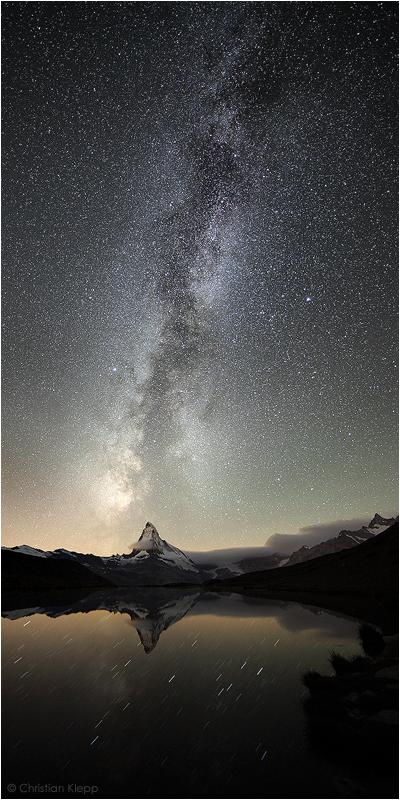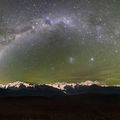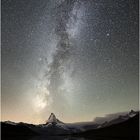Stellar Sunshine
Im August steht die Milchstrasse morgens um drei Uhr über dem 4478 m hohem Gipfel des Matterhorns. In mondloser Nacht sind dann auch mit dem bloßen Auge unzählige Sterne unserer eigenen Galaxie zu erkennen. Um die Punktförmigkeit der Sterne während der vierminütigen Belichtung zu erhalten, wurde die Kamera mittels einer Sternnachführung bezüglich der Erdrotation korrigiert. Dadurch werden auch lichtschwache Sterne sichtbar, so dass die Gesamtanzahl der Sterne stark ansteigt. Bei der Spiegelung der Sterne im See verbleiben diese immer als Strichspuren, da auch die kompensatorische Ausgleichsbewegung gespiegelt wird. Dadurch wird die Dynamik der Erdrotation sichtbar. Unter dem gewaltigen Firmament der Milchstrasse, mit seinen aus Staub bestehenden Dunkelwolken, geht links vom Matterhorn der Schütze und rechts davon der Skorpion unter. Die zweigeteilte Milchstrasse über dem Matterhorn zeigt das Schild sowie den Schlangenträger. Darüber schließt sich das Sommerdreieck mit den hellen Sternen Atair im Adler, Wega in der Leier sowie Deneb im Schwan an. Am oberen Bildrand steht das Sternbild Kepheus sowie die Region der Kassiopeia.
August 2011
Canon 5D MkII, Rokinon 14 mm, f/2.8, statische und dynamische Aufnahme je 4 Min, ISO 1600, Stativ, Astro-Trac TT320 digitale Sternnachführung
Mehr Information:
http://www.lichtjahre.eu
Where Geoscience Meets Art
-------------------------
In August around 3 am the Milky Way rises above the 14692 ft (4478 m) high Matterhorn in the Swiss Alps. After moonset or at new moon millions of stars belonging to our galaxy light up the sky. Realizing pointy stars during the 4 minutes exposure time requires star tracking with the camera to compensate for earth rotation. This causes also faint stars to appear on the image so that the number of stars visible largely increases. However, the reflection of the stars in the lake remain as trails as the star tracking is mirrored and hence tracks in the wrong direction. Hence this effect documents the dynamics of the earth rotation. Under the vast firmament of the Milky Way the star constellations of Sagittarius and Scorpius are setting below the horizon to the left and right of Matterhorn. The twofold Milky Way intersected by dark clouds of interstellar dust shows the constellations of Scutum and the Ophiuchus. Just above three bright stars are visible that belong to the so called summer triangle. These stars are Atair of Aquila, Wega in Lyra and Deneb in Cygnus. The constellations atop the image belong to Cepheus and the Cassiopeia.
August 2011
Canon 5D MkII, Rokinon 14 mm, f/2.8, static and dynamic exposure of 4 min, ISO 1600, tripod, AstroTrac TT320 digital astronomical mount
More information:
http://www.lichtjahre.eu
Where Geoscience Meets Art
Meinen herzlichen Dank an für den Vorschlag und natürlich an alle Pro, Con und Skip Voter für Ihre Zeit!




























Andreas.Kasper 18/08/2018 20:05
Grandios. Mit der Astrofotgrafie möchte ich auch mal anfangen. Derzeit lese ich mich in die Materie ein.LG Andi
little_beluga 13/01/2018 11:14
Phantastisch !!!.....Hans Götz1967 28/11/2016 17:29
Super schön, besonders die Spigelung im Wasser. Likefabrizio bertini 10/09/2012 21:06
complimenti bellissima immagine ++++++++++++++++++ciao fabrizio
IRIS-PHOTO 19/06/2012 14:52
Schöne Fotomontage ;)dreckshummel 30/03/2012 18:47
Wie ich es liebe!dreckshummel 25/02/2012 0:14
Solche Aufnahmen liebe ich einfach!!!!!!!!!!Grüße
Daniel
Bernd Pelger 26/11/2011 8:43
finde es extrem stark und interessantSterni . 10/10/2011 12:56
well done !n o r B Ä R t 09/10/2011 21:51
Gratuliere zum Stern !Thomas Sterle 09/10/2011 21:49
WOW das Bild ist der Brüller!!!!! Ganz toll umgesetzt...Mirko Vecernik 28/09/2011 20:27
Wow, was für ein wunderbares Bild! Etwas so Besonderes kann einem nur gelingen, wenn man ein tiefes Wissen darüber mitbringt, was man fotografiert. Mit deinen Ausführungen beweist du, dass du dieses Wissen besitzt. Mit dem Foto ist dir m. E. ein Kunstwerk gelungen, da neben der wunderbaren Ansammlung von Sternen eine bekannte Bergkulisse sehr speziell dargestellt wird. Letztlich sind auch die Farben sehr ansprechend und sorgen ebenfalls dafür, dass sich dein Bild ins Gedächtnis "einbrennt". Große Kunst!LG Mirko
UllaARTs 19/09/2011 17:35
SIEHT AUS WIE EIN Ben Canalis!!!LG
ULLA
Zumsel 12/09/2011 21:08
Beeindruckende Arbeit!Gunther Ullrich 28/08/2011 15:15
Oh ja. Ich bin begeistert. Natur und Technik im Einklang. VG Ulli